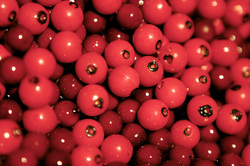
cranberries
Without a doubt, cranberries play an important role in your holiday traditions. We think of cranberries as turkey's sidekick. But we don't realize that cranberries surpass the nutritional value of any Thanksgiving traditional dishes. There are a lot of reasons to get acquainted more with these wonderful berries. According to researcher Amy Howell of the Rutgers University’s Marucci Center for Blueberry and Cranberry Research, cranberries are among the superstar foods proven to have health benefits.
And among the fruits and vegetables rich in antioxidants, cranberries rank at the top of the list. Antioxidants are necessary in combating free radicals that are damaging to the cellular structures and DNA. Thus, these antioxidants help to prevent aging, diseases and other health problems. Cranberries are also well-known for their ability to prevent urinary tract infections (UTIs).
Additionally, cranberries contain nutrients that act as antibiotics, fighting the herpes virus, supporting gastrointestinal and oral health. Cranberries contain citric acid and other nutrients that can prevent kidney and bladder problems.
Cranberries are rich in vitamins; they contain high concentrations of vitamin C, dietary fiber, manganese and vitamin K. Vitamin C plays an important role in the growth and repair of tissues in your body.
Cranberries contain a large number of macro-and micronutrients, including calcium, magnesium, iodine, boron, and others. Cranberry juice helps to enhance the body's immune system, it also protects against colds. Since cranberry juice contains proanthocyanidins, it can help block urinary tract infections. It prevents E. coli bacteria from sticking to the walls of the uterus and bladder. Regular consumption of cranberries normalizes metabolism. Cranberries are also known for their cancer preventive properties.
Season: October - December
How to select
Look for shiny, plump, bright light red to dark red cranberries. Also, cranberries should be able to bounce.
How to store
Cranberries are very well preserved due to benzoic acid - a natural preservative. When placed in the freezer, cranberries will retain most of their nutrients. However, it is important to note that, thawed cranberries should be consumed the same day, as thawed berries rapidly loose their nutrients.
How to prepare
Since cranberries are extremely tart, they can be combined with other fruits when cooked. Dried cranberries can be used in salads, or in place of raisins. You can also buy frozen cranberries which you can add daily to your smoothies.
And among the fruits and vegetables rich in antioxidants, cranberries rank at the top of the list. Antioxidants are necessary in combating free radicals that are damaging to the cellular structures and DNA. Thus, these antioxidants help to prevent aging, diseases and other health problems. Cranberries are also well-known for their ability to prevent urinary tract infections (UTIs).
Additionally, cranberries contain nutrients that act as antibiotics, fighting the herpes virus, supporting gastrointestinal and oral health. Cranberries contain citric acid and other nutrients that can prevent kidney and bladder problems.
Cranberries are rich in vitamins; they contain high concentrations of vitamin C, dietary fiber, manganese and vitamin K. Vitamin C plays an important role in the growth and repair of tissues in your body.
Cranberries contain a large number of macro-and micronutrients, including calcium, magnesium, iodine, boron, and others. Cranberry juice helps to enhance the body's immune system, it also protects against colds. Since cranberry juice contains proanthocyanidins, it can help block urinary tract infections. It prevents E. coli bacteria from sticking to the walls of the uterus and bladder. Regular consumption of cranberries normalizes metabolism. Cranberries are also known for their cancer preventive properties.
Season: October - December
How to select
Look for shiny, plump, bright light red to dark red cranberries. Also, cranberries should be able to bounce.
How to store
Cranberries are very well preserved due to benzoic acid - a natural preservative. When placed in the freezer, cranberries will retain most of their nutrients. However, it is important to note that, thawed cranberries should be consumed the same day, as thawed berries rapidly loose their nutrients.
How to prepare
Since cranberries are extremely tart, they can be combined with other fruits when cooked. Dried cranberries can be used in salads, or in place of raisins. You can also buy frozen cranberries which you can add daily to your smoothies.
 RSS Feed
RSS Feed